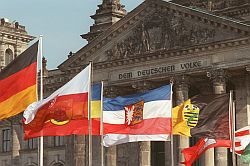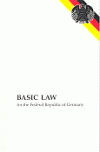Stage 1 of the federalism reform
Since 1 September 2006, provisions concerning reform of the federal system have been in place. The goal of the reform is to enhance the ability of both the Federation and the Länder to take decisions and to make the division of political powers clearer. It was on 30 June 2006 that the Members of the Bundestag voted in favour of the most comprehensive reform of the Basic Law since 1949.
This reform reduces the number of federal laws requiring the consent of the Bundesrat. At the same time, however, some powers have been transferred to the Länder, such as social housing and matters concerning the pay, pensions and allowances of civil servants employed by the Länder. The Länder are responsible for the prison system and for shop-opening hours. Nuclear energy and the prevention of terrorism, along with the registration of residents and the protection of German cultural treasures against dispersion abroad are matters for the Federation. The Federation also gained powers in the fields of environmental policy and waste management. In science and research at universities, the Federation and Länder are able to work together on projects of supra-regional importance.
Success the second time around
On 17 December 2004, the negotiations on reform of federalism unexpectedly reached deadlock, even though agreement had looked likely in advance. Following the announcement of new elections on 22 May 2005, the project was put on ice.
It was only after the formation of the grand coalition in November 2005 that the two strongest parties were able to agree on a model for reform of the federal system.
Following discussions within the cabinet and the coalition parliamentary groups and talks between the Minister-Presidents of the Länder, a second attempt was made to bring the deliberations in the German Bundestag and the Bundesrat to a successful conclusion.


